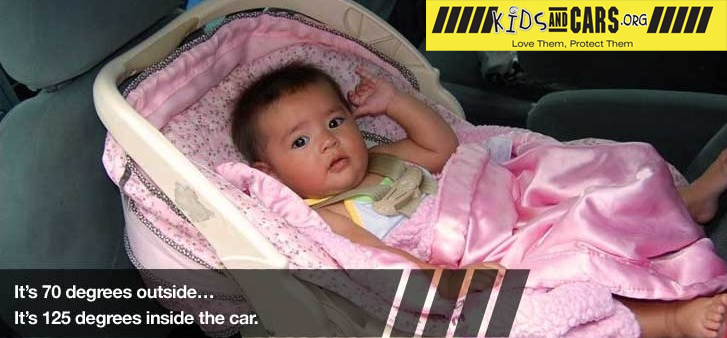Vehicular Heatstroke Can Be Avoided
June 11, 2014 | Category: Child Injuries | ShareIn 2013, 44 children in the U.S. died of heatstroke when being left in hot vehicles; seven children have died just this past month. NBC-2 reported on May 31 on the warning a local father wants others to hear after he lost his 17-month old daughter four years ago in such a tragedy. Vehicular heatstroke can be avoided.
KidsAndCars.org issued a news release May 23 alerting everyone to this senseless tragedy and reminding drivers to "Look Before They Lock" their vehicles. SafeKids.org says that heatstroke is the leading cause of non-crash, vehicle-related deaths for children. On average, every 10 days a child dies from heatstroke in a vehicle.

"As we approach summer in Florida, the danger of children dying from being left unattended in vehicles increases," says Child Injury Attorney, Randall Spivey of Spivey Law Firm, Personal Injury Attorneys, P.A.
Heatstroke occurs when a person's temperature exceeds 104 degrees F and their thermoregulatory mechanism is overwhelmed. Some symptoms include dizziness, disorientation, agitation, confusion, sluggishness, seizure, hot dry skin that is flushed but not sweaty, loss of consciousness, rapid heartbeat, and hallucinations. A core body temperature of 107 degrees F or greater can be lethal as cells are damaged and internal organs begin to shut down. Children's thermoregulatory systems are not as efficient as an adult's, and their body temperatures warm at a rate 3 to 5 times faster than an adult’s body. (Heatstroke Deaths of Children in Vehicles, San Francisco State University, Department of Earth and Climate Sciences - May 29, 2014)
NHTSA (National Highway Traffic Safety Administration), Safe Kids and its safety partners recommend these prevention tips:
- Never leave infants or young children unattended in a vehicle, even if the windows are partially open or the engine is running and the air conditioning is on.
- Do things to remind yourself that a child is in the vehicle, such as placing a purse or briefcase in the back seat or writing a note.
- Make a habit of looking in the vehicle—front and back—before locking the door and walking away.
- If you are dropping your child or children off at childcare, and it is normally your spouse, partner, or caregiver who drops them off, have him or her call you to make sure the drop off went according to plan.
- Set a reminder on your cell phone or calendar to alert you to be sure you dropped your child off at day care. You can also download the Baby Reminder AppforiPhones.
- Never let children play in an unattended vehicle. Teach them a vehicle is not a play area.
- If you see a child or children alone in a hot vehicle, call 911 or your local emergency number immediately. If they are in distress due to heat, get them out as quickly as possible, and cool them rapidly (not an ice bath but by spraying them with cool water or with a garden hose).
- Set a policy with daycare to call you IMMEDIATELY if your child does not show up.
- If you can't find your child, check inside the vehicle and trunk IMMEDIATELY to prevent heatstroke.
Fort Myers Child Injuries Attorney, Randall L. Spivey is a Board Certified Trial Attorney – the highest recognition for competence bestowed by the Florida Bar and a distinction earned by just one (1%) percent of Florida attorneys. He has handled over 2,000 personal injury and wrongful death cases throughout Florida. For a free and confidential consultation to discuss your legal rights, contact the Spivey Law Firm, Personal Injury Attorneys, P.A., in Lee County at 239.337.7483 or toll free at 1.888.477.4839,or by email to Randall@SpiveyLaw.com. Visit SpiveyLaw.com for more information. You can contact Spivey Law Firm, Personal Injury Attorneys, P.A.in Charlotte County at 941.764.7748 and in Collier County 239.793.7748.

